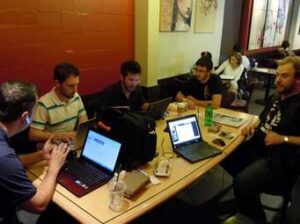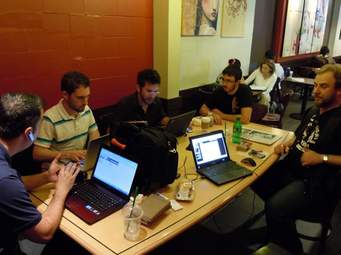
If you find it difficult to focus on certain tasks in your current environment, try changing your environment. It is possible that simply being in your office, where you may have built a habit of checking email, staring out the window or twisting paper clips, prompts these distracting habits to recur. That’s why it’s easier to start a new behavior in a new location, as reported in the March/April, 2012 issue of Scientific American Mind.
Two things experienced together will become associated with each other in our mind. This is known as the law of contiguity, and is used to advantage when memorizing something. Things or events that occur close to each other in space or time tend to get linked together in the mind. If you think of a cup, you may think of a saucer; if you hear a song, you may recall events that happened when that song was popular. When you see again the house that you were born and raised in, you are flooded with memories of things that happened at that time. When you see the ocean, it may remind you of a time you almost drowned there. And so on. This can work against you as well. Your office may become associated with procrastination or anxiety or daydreaming just as your bed becomes associated with sleep.
More and more people seem to be using their local coffee shop as an effective place to work. Although loud noises are distracting, the steady hum of a busy coffee shop with its mixture of espresso machines running and customer conversation seems to provide just the right level of “white noise” to stimulate creativity and concentration. (Researchers also found that adding white noise to a classroom can be as effective as drugs and eating learning among ADHD pupils.)
Entrepreneurs are even beginning to capitalize on this trend by turning coffee shops or restaurants into co-working spaces. Susan Johnston, writing for FastCompany.com, mentioned that CoworkCafé and other entrepreneurial companies are renting out after-hours space in coffee shops, complete with desks, lockers, Wi-Fi and food vouchers.
The majority of my articles, segments of my books, and countless newsletters were written in coffee shops. I find I am alone while not alone, with complete anonymity, yet able to feed off the energy of others. It’s an excellent time to silence your iPhone or other devices and work undisturbed. Wi-Fi is available, lighting is normally good, and any inefficient work habits seem to remain back at the office. If you need to make the odd call, your voice is muted by the ambient noises. And as an added bonus, a cup of coffee stimulates creativity as well. I write longhand since it further increases my concentration and allows me to edit as I go along. Using voice activated software, I can quickly dictate the results to my laptop when I get back to my home office.
If you can’t make it to a coffee shop, you can always go to coffitivity.com and bring the sounds of a coffee shop to your computer while you work. Back in 2013, Coffitivity was launched when its founder realized the benefits of re-creating the ambient sounds of a coffee shop to boost people’s creativity and help them increase their performance.
It seems that a moderate noise level is the sweet spot for creativity. It doesn’t distract us as loud noises tend to do. It doesn’t seem to matter whether it is in the form of ocean waves, chatter or music. In the case of music, there is a link between music and executive function. Sylvain Marino, a scientist with the Rotman Research Institute, was able to produce a 14-point increase in IQ in preschoolers by exposing them to a computerized music program for 20 days. If you like to work with music in the background, choose a genre such as classical or blues that works best for you. You can do this by having music from accuradio.com playing on your computer in the background as you work.
Ravi Mehta, an assistant professor at the University of Illinois, believes that a blue background screen on your computer also improves performance when working on a creative tasks, while a red background is better with more detail-oriented tasks.
What is most important, in my opinion, is having a “high performance area” where you work your best, regardless of where that might be. But if you are restricted to do all your work in a corporate or home office, there is much more you can do to aid your performance, which I will discuss in the next blog article.
Next blog article: Boosting performance in your home office.


Recent Comments